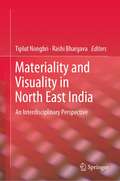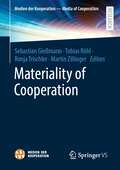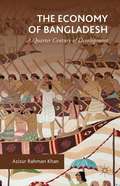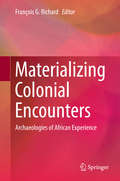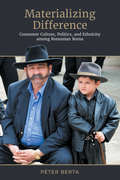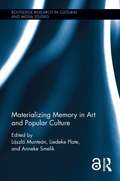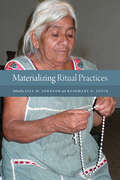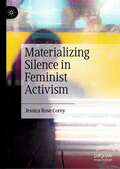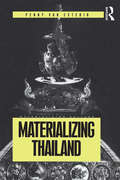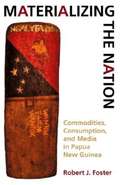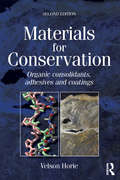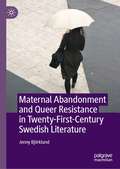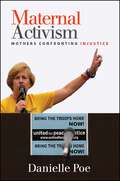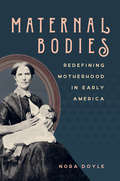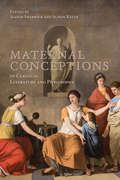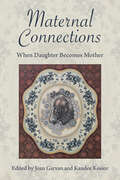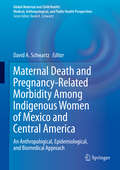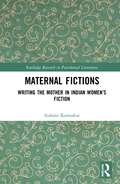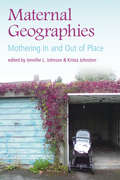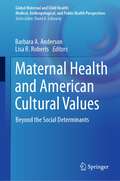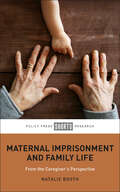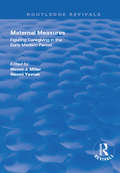- Table View
- List View
Materiality and Visuality in North East India: An Interdisciplinary Perspective
by Rashi Bhargava Tiplut NongbriThis edited book set in the context of North East India explores issues concerning symbols, meanings, representations, and social implications of materiality and visuality, as well as the dynamics of power, social reproduction, ideological dominance and knowledge production, from an interdisciplinary perspective. It seeks to answer the question of why some things matter more than others or what happens when certain things are made more visible than others. The book provides valuable insights into the process of identity construction through the use of cultural sources, both material and visual. Following on the debates/discussions on material and visual culture in the 1970s and 1980s, the book argues that instead of viewing objects as mere representation(s), one should see them as active agents in creating perceptions, bodily practices, discourses and perceptions of our social world. Each chapter in the book unravels and engages with these pertinent issues in order to arrive at a more comprehensive understanding of the status quo. The book is of interest to scholars of ethnicity, identity construction, politics and state, cultural studies, media studies, visual, social and cultural anthropology and sociology, as well as lay readers who want to learn more about the region.
Materiality of Cooperation (Medien der Kooperation – Media of Cooperation)
by Martin Zillinger Tobias Röhl Sebastian Gießmann Ronja TrischlerThe volume investigates the socio-material dimension and media practices of cooperation – before, during and beyond situations. Cooperation is understood as reciprocal interplay operating with or without consensus, in co-presence or absence of the involved actors in distributed situations. Artefacts, bodies, texts and infrastructures are the media that make cooperation possible. They enable and configure reciprocal accomplishments – and are themselves created through media practices in cooperative situations.
Materiality, Rules and Regulation: New Trends in Management and Organization Studies (Technology, Work and Globalization)
by Nathalie Mitev François-Xavier de Vaujany Anouk Mukherjee Giovan LanzaraMateriality, Rules and Regulation: New Trend in Management and Organization Studies concentrates on the relationship of rules and regulation to the materiality of artefacts, practices, and organizations. It combines the recent scholarly interest on sociomateriality with a focus on regulation and rules.
Materializing Colonial Encounters
by François G. RichardThis volume investigates the material production and expression of colonial experiences in Africa. It combines archaeological, historical, and ethnographic sources to explore the diverse pathways, practices, and projects constructed by Africans in their engagement with the forces of colonial modernity and capitalism. This volume is situated in ongoing debates in archaeological and anthropological approaches to materiality. In this respect, it seeks to target archaeologists interested in the conceptual issues provoked by colonial enfoldments. It is also concerned with increasing the visibility of relevant African archaeological literature to scholars of colonialism and imperialism laboring in other fields. This book brings together an array of junior and senior scholars, whose contributions represent a rich sample of the vibrant archaeological research conducted in Africa today, blending conceptual inspiration with robust fieldwork. The chapters target a variety of cultural, historical, and colonial settings. They are driven by a plurality of perspectives, but they are bound by a shared commitment to postcolonial, critical, and material culture theories. While this book focuses on western and southern Africa - the sub-regions that boast the deepest traditions of historical archaeological research in the continent - attention was also placed on including case-studies from traditionally less well-represented areas (East African and Swahili coasts, Madagascar), whose material pasts are nevertheless essential to a wider comprehension of variability and comparability of 'modern' colonial conditions. Consequently, this volume lends a unique wide-ranging look at African experiences across the tangle of imperial geographies on the continent, with case-studies focusing on Anglophone, Francophone, and Dutch-speaking contexts. This volume is an exciting opportunity to present this work to wider audiences and foster conversations with a wide community of scholars about the material fashioning of colonial life, relations, and configurations of power.
Materializing Difference: Consumer Culture, Politics, and Ethnicity among Romanian Roma (Anthropological Horizons)
by Peter BertaHow do objects mediate human relationships, and possess their own social and political agency? What role does material culture – such as prestige consumption as well as commodity aesthetics, biographies, and ownership histories – play in the production of social and political identities, differences, and hierarchies? How do (informal) consumer subcultures of collectors organize and manage themselves? Drawing on theories from anthropology and sociology, specifically material culture, consumption, museum, ethnicity, and post-socialist studies, Materializing Difference addresses these questions via analysis of the practices and ideologies connected to Gabor Roma beakers and roofed tankards made of antique silver. The consumer subculture organized around these objects – defined as ethnicized and gendered prestige goods by the Gabor Roma living in Romania – is a contemporary, second-hand culture based on patina-oriented consumption. Materializing Difference reveals the inner dynamics of the complex relationships and interactions between objects (silver beakers and roofed tankards) and subjects (Romanian Roma) and investigates how these relationships and interactions contribute to the construction, materialization, and reformulation of social, economic, and political identities, boundaries, and differences. It also discusses how, after 1989, the political transformation in Romania led to the emergence of a new, post-socialist consumer sensitivity among the Gabor Roma, and how this sensitivity reshaped the pre-regime-change patterns, meanings, and value preferences of prestige consumption.
Materializing Memory in Art and Popular Culture (Routledge Research in Cultural and Media Studies)
by Liedeke Plate Anneke Smelik Laszlo MunteanMemory matters. It matters because memory brings the past into the present, and opens it up to the future. But it also matters literally, because memory is mediated materially. Materiality is the stuff of memory. Meaningful objects that we love (or hate) function not only as aide-mémoire but are integral to memory. Drawing on previous scholarship on the interrelation of memory and materiality, this book applies recent theories of new materialism to explore the material dimension of memory in art and popular culture. The book’s underlying premise is twofold: on the one hand, memory is performed, mediated, and stored through the material world that surrounds us; on the other hand, inanimate objects and things also have agency on their own, which affects practices of memory, as well as forgetting. By accounting for the material world as a medium through which acts of remembering and forgetting take place, the chapters of this book offer new insights on such topics as the study of ruins, the exchange and circulation of souvenirs, digitization and the Internet of Things, fashion and technology, as well as the material dimensions of corporeality and traumatic re-enactment.
Materializing Ritual Practices
by Rosemary A. Joyce Lisa M. JohnsonMaterializing Ritual Practices explores the deep history of ritual practice in Mexico and Central America and the ways interdisciplinary research can be coordinated to illuminate how rituals create, destroy, and transform social relations. Ritual action produces sequences of creation, destruction, and transformation, which involve a variety of materials that are active and agential. The materialities of ritual may persist at temporal scales long beyond the lives of humans or be as ephemeral as spoken words, music, and scents. In this book, archaeologists and ethnographers, including specialists in narrative, music, and ritual practice, explore the rhythms and materiality of rituals that accompany everyday actions, like the construction of houses, healing practices, and religious festivals, and that paced commemoration of rulers, ancestor veneration, and relations with spiritual beings in the past. Connecting the kinds of observed material discursive practices that ethnographers witness to the sedimented practices from which archaeologists infer similar practices in the past, Materializing Ritual Practices addresses how specific materialities encourage repetition in ritual actions and, in other circumstances, resist changes to ritual sequences. The volume will be of interest to cultural anthropologists, archaeologists, and linguists with interests in Central America, ritual, materiality, and time. Contributors: M. Charlotte Arnauld, Giovani Balam Caamal, Isaac Barrientos, Cedric Becquey, Johann Begel, Valeria Bellomia, Juan Carillo Gonzalez, Maire Chosson, Julien Hiquet, Katrina Kosyk, Olivier Le Guen, Maria Luisa Vasquez de Agredos Pascual, Alessandro Lupo, Philippe Nondedeo, Julie Patrois, Russel Sheptak, Valentina Vapnarsky, Francisca Zalaquett Rock
Materializing Silence in Feminist Activism
by Jessica Rose CoreyThis book examines how rhetorically effective uses of silence and materiality mediate feminist activism and discusses the implications of these dynamics for pedagogy. Specifically, the text establishes a theoretical foundation for what the author terms “psychosocial composing,” or “the metaphorical composing and revising of individual participants and society, and the contribution of written and visual texts as an input and output of the relationships between individuals and social culture.” This idea is examined through primary research on the Clothesline Project, an international event that invites people who have experienced gender violence (directly or indirectly) to decorate tee shirts that get hung on clotheslines in public places. Through looking at values and roles of silence in global cultures and the use of material arts in activist efforts, the author argues for the unique value of silence and materiality in individual and collective spaces. The manuscript includes discussion questions and sample teaching materials. Overall, making connections among composition and rhetoric, psychology, sociology, politics, women’s studies, art and design, pedagogy, and history, this book further demonstrates the potential interdisciplinary approaches to rhetoric and communication.
Materializing Thailand (Materializing Culture)
by Penny Van EsterikThailand has become well known throughout the world for wonderful cuisine, great package holidays, sumptuous temples and textiles. Noticeably absent from glossy tourist brochures but equally well known throughout the Western world is Thailand's seedier side - the world of child exploitation, rampant prostitution and AIDS. Thailand maintains its appeal by slipping the ugly and painful out of sight and by promoting women as exotic visual icons through beauty contests, state rituals and the sex trade. This book explores the construction of gender in Thailand and in particular the role Bangkok plays in establishing gender relations for the whole of the country. It examines the historical and cultural processes underlying Thai public culture, including historical theme parks. The author demonstrates how the materiality of the Thai world shapes gender relations and how Buddhism discourages essentialisms, including fixed binary gender identities. Throughout the book, appearances are shown to be critically important, and the essentialism of gender is maintained through display, public presentations, and everyday material practices. Anyone wishing to understand the complexity of Thailand will find this book provides a highly readable and insightful analysis.
Materializing the Nation: Commodities, Consumption, and Media in Papua New Guinea
by Robert J. Foster"Foster shows us how seemingly banal activities like making a phone call, chewing betel nut, watching a Coke commercial may give important insights into the ways in which the nation is constructed, materialized or contested."--Orvar Löfgren, author of On Holiday: A History of VacationingWhy, in the current era of globalization, does nationality remain an important dimension of personal and collective identities? In Materializing the Nation, Robert J. Foster argues that the contested process of nation making in Papua New Guinea unfolds not only through organized politics but also through mundane engagements with commodities and mass media. He offers a thoughtful critique of recent approaches to nationalism and consumption and an ethnographic perspective on constructs of the nation found in official policy documents, letters to the editor, school textbooks, song lyrics, advertisements, and other materials. This volume will appeal to readers interested in the links among nationalism, consumption, and media, in Melanesia and elsewhere.
Materials for Conservation
by C V HorieMaterials in Conservation is the definitive introduction to the properties of materials used in conservation. The continual struggle of conservators to ameliorate the deterioration of objects has led to increasing use of synthetic polymers. These materials are part of the sophisticated technology that has been developed to augment and often replace traditional materials and methods. Conservators therefore have a wider range of techniques available. However, they must be able to appreciate the potentials and pitfalls of any proposed technique. The first section explains physical and chemical properties which are important in the conservation process, i.e. application, ageing, reversal. The topics covered include molecular weight, glass transition temperature, solubility and solvents, polymerisation and degradation reactions. The second section provides a detailed consideration of the individual materials, current and obsolete, used in conservation, drawing out the factors relevant to their effects on objects. The conservation uses of each material are summarised and referenced to allow further study. In five appendices, the properties of the polymers, solvents and their interactions are tabulated, with a list of suppliers and conversion table of physical units. IUPAC and SI nomenclature is used throughout the book. In this second edition, this classic text is revised and updated to include modern materials such as cyclododecane, and current ideas on adhesion, consolidation and reversibility, making Materials in Conservation the definitive source of vital information in the field. This handy reference book should be on the bench of every conservator and available wherever objects, from steam engines to dried plants, are preserved.
Maternal Abandonment and Queer Resistance in Twenty-First-Century Swedish Literature
by Jenny BjörklundThis book questions why so many mothers leave their families in twenty-first-century Swedish literature, analyzing literary representations of maternal abandonment in relation to sociopolitical discourses. The volume draws on a queer-theoretical framework in order to highlight norm-critical dimensions, failure, and resistance in literature about motherhood. Jenny Björklund argues that novels about mothers who leave can be understood as ways to problematize and challenge Swedish-branded values like gender equality and a progressive family politics that promotes ideals of involved parenthood, the nuclear family, and pronatalism. The book also raises questions beyond the Swedish context about maternal ambivalence, family politics, and privilege and discusses how literature can work as resistance and provide alternatives to the current social order.
Maternal Activism: Mothers Confronting Injustice (SUNY series, Praxis: Theory in Action)
by Danielle PoeMaternal Activism tells the stories of women who refused to ignore injustice even though many people urged them to stop their activism by claiming it would harm their children. Molly Rush, Michele Naar-Obed, Cindy Sheehan, and Diane Wilson recognized that the potential well-being of their children relates to the damage done by US militarism and environmental destruction. These women's stories illustrate feminist ethical theory and contemporary theory from peace studies. By examining their context for addressing injustice and the theoretical supports for their action, this book demonstrates that issues of injustice overlap such that critiques of nuclear weapons lead to critiques of war and militarism, which lead to critiques of environmental destruction.
Maternal And Child Nursing Care
by Michele Davidson Jane Ball Marcia London Patricia Ladewig Ruth Bindler Kay CowenDesigned to support faster, more efficient learning in condensed courses, Maternal & Child Nursing Care presents key content about maternal-newborn nursing, women’s health, and pediatric nursing topics in an accurate, readable way. Throughout this family-focused text, special attention is paid to health promotion, home/community care, patient and family education, clinical reasoning, evidence-based practice, and cultural competence. Engaging features help readers learn and retain essential concepts in a short period of time.
Maternal Bodies: Redefining Motherhood in Early America
by Nora DoyleIn the second half of the eighteenth century, motherhood came to be viewed as women's most important social role, and the figure of the good mother was celebrated as a moral force in American society. Nora Doyle shows that depictions of motherhood in American culture began to define the ideal mother by her emotional and spiritual roles rather than by her physical work as a mother. As a result of this new vision, lower-class women and non-white women came to be excluded from the identity of the good mother because American culture defined them in terms of their physical labor. However, Doyle also shows that childbearing women contradicted the ideal of the disembodied mother in their personal accounts and instead perceived motherhood as fundamentally defined by the work of their bodies. Enslaved women were keenly aware that their reproductive bodies carried a literal price, while middle-class and elite white women dwelled on the physical sensations of childbearing and childrearing. Thus motherhood in this period was marked by tension between the lived experience of the maternal body and the increasingly ethereal vision of the ideal mother that permeated American print culture.
Maternal Conceptions in Classical Literature and Philosophy (Phoenix Supplementary Volumes #57)
by Alison Sharrock Alison KeithUnlike many studies of the family in the ancient world, this volume presents readings of mothers in classical literature, including philosophical and epigraphic writing as well as poetic texts. Rather than relying on a male viewpoint, the essays offer a female perspective on the lifecycle of motherhood. Although almost all ancient authors are men, this book nevertheless aims to unpack carefully the role of the mother – not as projected by the son or other male relations, but from a woman’s own experiences – in order to better understand how they perceived themselves and their families. Because the primary interest is in the mothers themselves, rather than the authors of the texts in which they appear, the work is organized according to the lifecycle of motherhood instead of the traditional structure of the chronology of male authors. The chronology of the male authors ranges from classical Greece to late antiquity, while the motherly lifecycle ranges from pre-conception to the commemoration of offspring who have died before their mothers.
Maternal Connections: When Daughter becomes Mother
by Kandee Kosior Joan GarvanThis is a wonderful and insightful collection of stories and reflections of mothers on the connection with their own mother after becoming a mother themselves. The chapters are primarily autobiographical and are told through a range of lens, be it a graphic chapter or the more literary. An author outlines Anishinaabeg ceremonial practices that honour and represent maternal connections, and others demonstrate how art and craft can both assist in working through and carry forward maternal stories. Two further pieces use a combination of literary critique, feminist theory and post-Freudian psychoanalysis to interpret varied texts and another highlights findings from a series of interviews with women reflecting on the attributes and practices they will carry forward or discard from their experience of being mothered.
Maternal Death and Pregnancy-Related Morbidity Among Indigenous Women of Mexico and Central America: An Anthropological, Epidemiological, And Biomedical Approach (Global Maternal and Child Health)
by David A. SchwartzThis ambitious sourcebook surveys both the traditional basis for and the present state of indigenous women’s reproductive health in Mexico and Central America. Noted practitioners, specialists, and researchers take an interdisciplinary approach to analyze the multiple barriers for access and care to indigenous women that had been complicated by longstanding gender inequities, poverty, stigmatization, lack of education, war, obstetrical violence, and differences in language and customs, all of which contribute to unnecessary maternal morbidity and mortality. Emphasis is placed on indigenous cultures and folkways—from traditional midwives and birth attendants to indigenous botanical medication and traditional healing and spiritual practices—and how they may effectively coexist with modern biomedical care. Throughout these chapters, the main theme is clear: the rights of indigenous women to culturally respective reproductive health care and a successful pregnancy leading to the birth of healthy children.A sampling of the topics: Motherhood and modernization in a Yucatec village Maternal morbidity and mortality in Honduran Miskito communities Solitary birth and maternal mortality among the Rarámuri of Northern Mexico Maternal morbidity and mortality in the rural Trifino region of Guatemala The traditional Ngäbe-Buglé midwives of Panama Characterizations of maternal death among Mayan women in Yucatan, Mexico Unintended pregnancy, unsafe abortion, and unmet need in GuatemalaMaternal Death and Pregnancy-Related Morbidity Among Indigenous Women of Mexico and Central America is designed for anthropologists and other social scientists, physicians, nurses and midwives, public health specialists, epidemiologists, global health workers, international aid organizations and NGOs, governmental agencies, administrators, policy-makers, and others involved in the planning and implementation of maternal and reproductive health care of indigenous women in Mexico and Central America, and possibly other geographical areas.
Maternal Desire: On Children, Love, and the Inner Life
by Daphne De MarneffeThis is an important and exciting addition to the debate about children, love and the inner life.Does identifying and talking about maternal desire feed old notions about women's nature and justify restrictions of their rights? Or is it an opportunity to understand women more deeply? Maternal Desire shows that the iconic images of motherhood - from the sacrificial mother to the supermum - and the endless debates about what's best for children, obscure the profound meaning of mothering - and the desire to mother. Here is a book that gives a common voice to mothers and examines motherhood as an active and transforming experience.
Maternal Desire: On Children, Love, and the Inner Life
by Daphne de MarneffeEsteemed pscyhologist Daphne de Marneffe examines women’s desire to care for children in an updated reissue of her “fascinating analysis that’s a welcome addition to the dialogues about motherhood” (Publishers Weekly).If a century ago it was women’s sexual desires that were unspeakable, today it is the female desire to mother that has become taboo. One hundred years of Freud and feminism have liberated women to acknowledge and explore their sexual selves, as well as their public and personal ambitions. What has remained inhibited is women’s thinking about motherhood. Maternal Desire is the first book to treat women’s desire to mother as a legitimate focus of intellectual inquiry and personal exploration. Shedding new light on old debates, Daphne de Marneffe provides an emotional road map for mothers who work and mothers who are at home. De Marneffe both explores the enjoyment and anxieties of motherhood and offers mothers in all situations valuable ways to think through their self-doubts and connect to their capacity for pleasure. Drawing on a rich tradition of writers, such as Simone de Beauvoir, Adrienne Rich, Carol Gilligan, and Susan Faludi, as well as her experience as a psychologist and mother of three, de Marneffe illuminates how we express our desire to care for children. By treating maternal desire as a central feature of women’s identity—rather than as an inconvenient or slightly embarrassing detail—we can look with fresh insight at controversial issues, such as childcare, fertility, abortion, and the role of fathers. An “absorbing look at the enormous personal pleasure that women derive from mothering….Maternal Desire is a stirring book that celebrates women’s love for their children and mothering while also supporting their interest in careers and other pursuits” (Booklist).
Maternal Fictions: Writing the Mother in Indian Women’s Fiction (Routledge Research in Postcolonial Literatures)
by Indrani KarmakarThis book constitutes a feminist literary analysis of motherhood as presented in selected Indian women’s fictions across a diverse range of geographical, linguistic, class and caste contexts. Situated at the crossroads of motherhood studies and literary studies, this book offers a rigorous examination of the prosody and politics of motherhood in this corpus. In its five thematically focused chapters, the book scrutinises in depth such key concerns as maternal ambivalence; maternal agency and caste; mother–daughter relationships; motherhood and diaspora; and non-biological motherhood. It attempts to understand the literary ramifications of these issues in order to identify the ways in which fiction writers reconceive of the notion of motherhood and maternal identities from and against multiple perspectives. Another pressing concern is whether these Indian women writers’ visions furnish readers with any different understandings of motherhood as compared to dominant Western feminist discourses. Maternal Fictions advances feminist literary criticism in the specific area of Indian women’s writing and the overarching areas of motherhood and literature by acting as a launchpad into a complex constellation of ideas concerning motherhood. The fictional universe is at once ambivalent, diverse, contingent, grounded in a specific location, and yet well placed to converse with discourses emanating from other times and places.
Maternal Geographies: Mothering In and Out of Place
by Jennufer L. JohnsonThis collection broaches the intersections of critical motherhood studies and feminist geography. Contributors demonstrate that an important dimension of the social construction of motherhood is how mothering happens in space and place, leading to the articulation of diverse maternal geographies. Through 16 concise chapters divided into three thematic sections, the contributors provide an account of motherhood and mothering as spatial practices that are embedded in relations of power across time and place. While some contributors explore how dominant discourses of motherhood seek to keep mothers in their place, others take up the notion of maternal geographies as productive in their own right and follow their subjects as they create a new sense of place. Collectively, the authors demonstrate that mothers are produced and regulated as subjects in relation to space and place, and also that practices of mothering produce spatial relationships.
Maternal Health and American Cultural Values: Beyond the Social Determinants (Global Maternal and Child Health)
by Barbara A. Anderson Lisa R. RobertsThis book uniquely explores American cultural values as a factor in maternal health. It looks beyond the social determinants of health as primarily contributing to the escalating maternal morbidity and mortality in the United States. The United States is an outlier with poor maternal health outcomes and high morbidity/mortality in comparison to other high-resource and many mid-level resource nations. While the social determinants of health identify social and environmental conditions affecting maternal health, they do not answer the broader underlying question of why many American women, in a high-resource environment, experience poor maternal health outcomes. Frequent near-misses, high levels of severe childbearing-related morbidity, and high maternal mortality are comparable to those of lower-resource nations. This book includes contributions from recognized medical and cultural anthropologists, and diverse clinical and public health professionals. The authors examine American patterns of decision-making from the perspectives of intersecting social, cultural, and medical values influencing maternal health outcomes. Using an interdisciplinary critical analysis approach, the work draws upon decision-making theory and life course theory. Topics explored include: Cultural values as a basis for decision-makingSocial regard for motherhoodImmigrants, refugees and undocumented mothersCultural conflicts and maternal autonomyHealth outcomes among justice-involved mothers Maternal Health and American Cultural Values: Beyond the Social Determinants is an essential resource for clinical and public health practitioners and their students, providing a framework for graduate-level courses in public health, the health sciences, women’s studies, and the social sciences. The book also targets anthropologists, sociologists, and women studies scholars seeking to explain the links between American cultural decision-making and health outcomes. Policy-makers, ethicists, journalists, and advocates for reproductive health justice also would find the text a useful resource.
Maternal Imprisonment and Family Life: From the Caregiver's Perspective
by Natalie BoothExploring the untold experiences of family members and friends caring for the children of female prisoners in England and Wales, this book sheds light on the collateral damage that incarceration causes those who takeover caregiving responsibilities for the children of female prisoners. Providing new qualitative research on the lived experiences of these caregiving relatives, alongside theoretically informed and policy-relevant insights, Booth shows the difficult and damaging consequences of the ‘family sentence’ they serve. Exploring the stigma, scarce statuary support and policy neglect they face, she offers much-needed evidence to encourage the development of a more inclusive, understanding and family-oriented justice system.
Maternal Measures: Figuring Caregiving in the Early Modern Period
by Naomi J. Miller and Naomi YavnehThis title was first published in 2000: Care-givers in the early modern period included not only mothers and stepmothers, but also midwives and nurses, tutors and educators, wise women and witches. The contributors to this volume present research and criticism on a wide range of early modern care-giving roles by women in England, Italy, Spain, France, Latin America, Mexico and the New World. The essays are not only cross-cultural but also interdisciplinary, spanning literature, history, music and art history; and they focus on differences of gender, class and race. A wide variety of scholarly and critical approaches are represented. Essays are grouped in categories on conception and lactation; maternal nurture and instruction; domestic production; and social authority.
